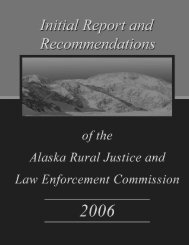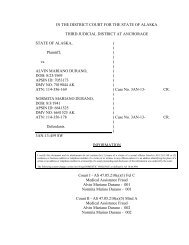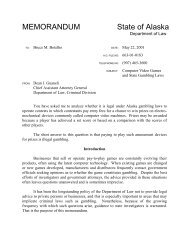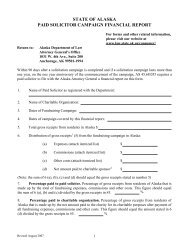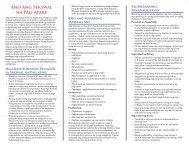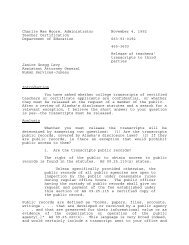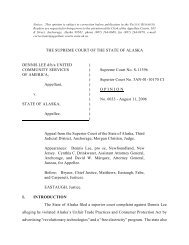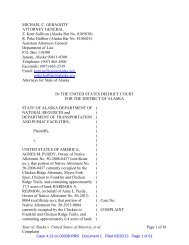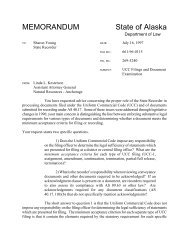Annual Report 2012 - Alaska Department of Law
Annual Report 2012 - Alaska Department of Law
Annual Report 2012 - Alaska Department of Law
Create successful ePaper yourself
Turn your PDF publications into a flip-book with our unique Google optimized e-Paper software.
Appeals<br />
The Appellate Unit represents the State in criminal appellate proceedings<br />
and state and federal post-conviction and habeas corpus proceedings; it<br />
also handles civil litigation challenging statutes related to criminal justice.<br />
The unit observed two trends this past year. First, the unit has seen a<br />
marked increase in appeals involving the superior court’s three-judge<br />
sentencing panel—a legislatively created panel <strong>of</strong> judges who can deviate<br />
from a presumptive sentence if imposing the presumptive sentence would<br />
be manifestly unjust. This appears to be in part due to the increased<br />
presumptive sentencing ranges for sexual assault and sexual abuse<br />
crimes, and in part due to more requests by defendants to be referred to<br />
the three-judge panel, regardless <strong>of</strong> the nature <strong>of</strong> their underlying crimes.<br />
The second observed trend is an increase in appeals raising constitutional<br />
issues regarding the Confrontation Clause (i.e., a criminal defendant’s right<br />
to confront and cross-examine witnesses testifying for the prosecution).<br />
This trend is undoubtedly due to a series <strong>of</strong> recent U.S. Supreme Court<br />
cases exploring the parameters <strong>of</strong> the Confrontation Clause.<br />
One <strong>of</strong> the most significant appellate<br />
decisions for the unit last year was<br />
the <strong>Alaska</strong> Supreme Court’s reversal<br />
<strong>of</strong> the Court <strong>of</strong> Appeals in State v.<br />
Gibson. The Court held that the police<br />
may enter a home without a warrant<br />
when they determine that serious<br />
domestic violence has occurred and<br />
it is unclear whether all people who<br />
may have been affected (including<br />
children) are accounted for. The facts<br />
<strong>of</strong> the case exemplify the <strong>of</strong>ten dynamic<br />
circumstances the police confront when<br />
responding to reports <strong>of</strong> domestic<br />
violence. The police were dispatched<br />
to a trailer home on the basis <strong>of</strong> a<br />
woman’s 9 1 1 call reporting that her<br />
boyfriend was threatening to stab<br />
her in the head. During the call, the<br />
dispatcher could hear a disturbance<br />
in the background. When the police<br />
arrived, a woman came running out <strong>of</strong><br />
the trailer; she was hysterical, bleeding<br />
from her head, and wearing only a<br />
tank top. The police took a man into<br />
custody and secured the woman in a<br />
patrol car. When asked, the woman told<br />
the police that no other people were<br />
in the trailer. Given the circumstances,<br />
the police did not believe the woman<br />
and entered the trailer to check for<br />
other victims where they discovered a<br />
methamphetamine laboratory. The Court<br />
<strong>of</strong> Appeals held that the police should<br />
not have entered the home without a<br />
warrant, but Assistant Attorney General<br />
William Hawley—who has served the<br />
State for over four decades—convinced<br />
the <strong>Alaska</strong> Supreme Court to reverse,<br />
holding that the entry was permissible<br />
under the circumstances.<br />
<strong>Annual</strong> <strong>Report</strong> <strong>2012</strong> ~ <strong>Alaska</strong> <strong>Department</strong> <strong>of</strong> <strong>Law</strong> 25



